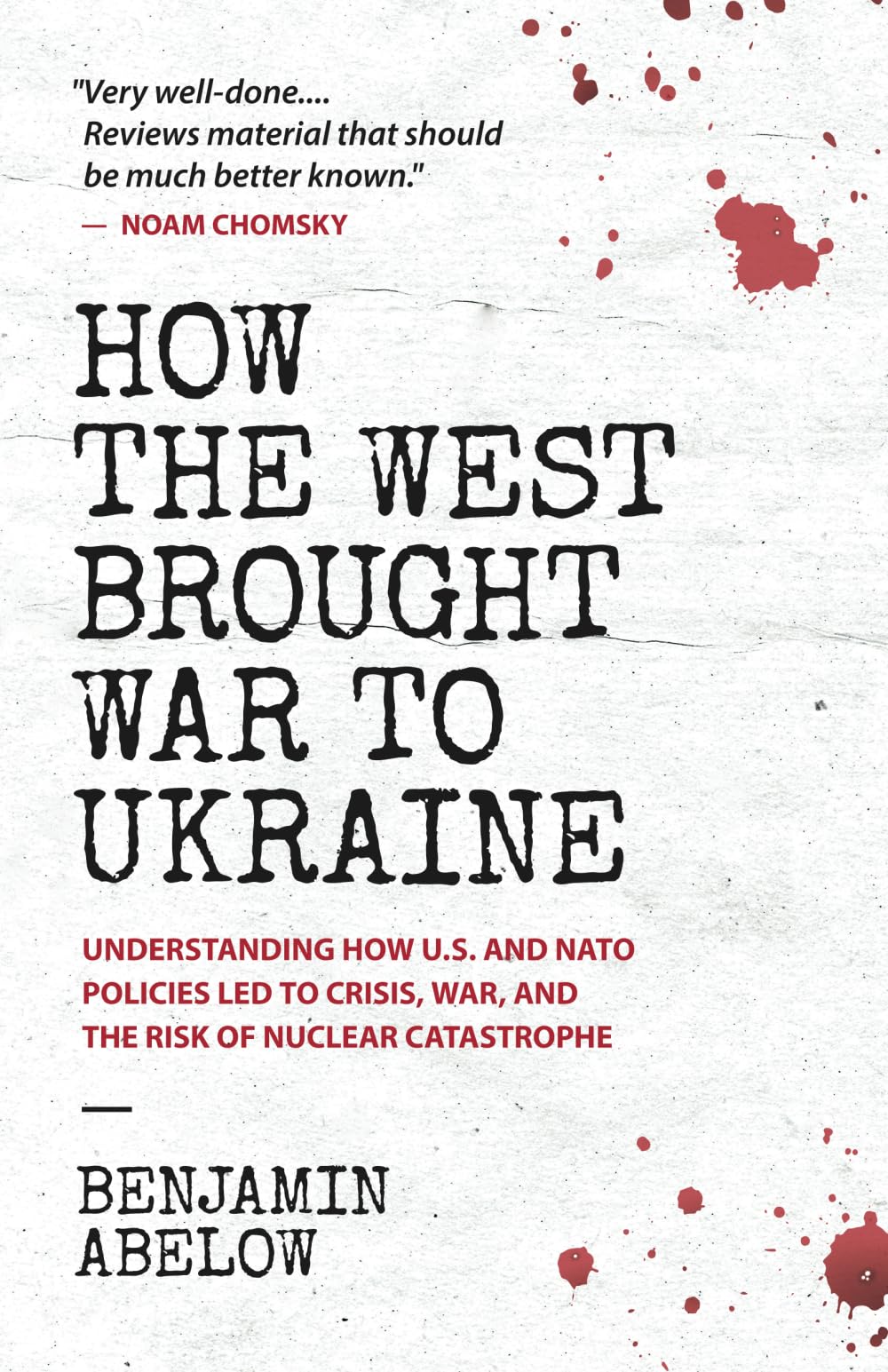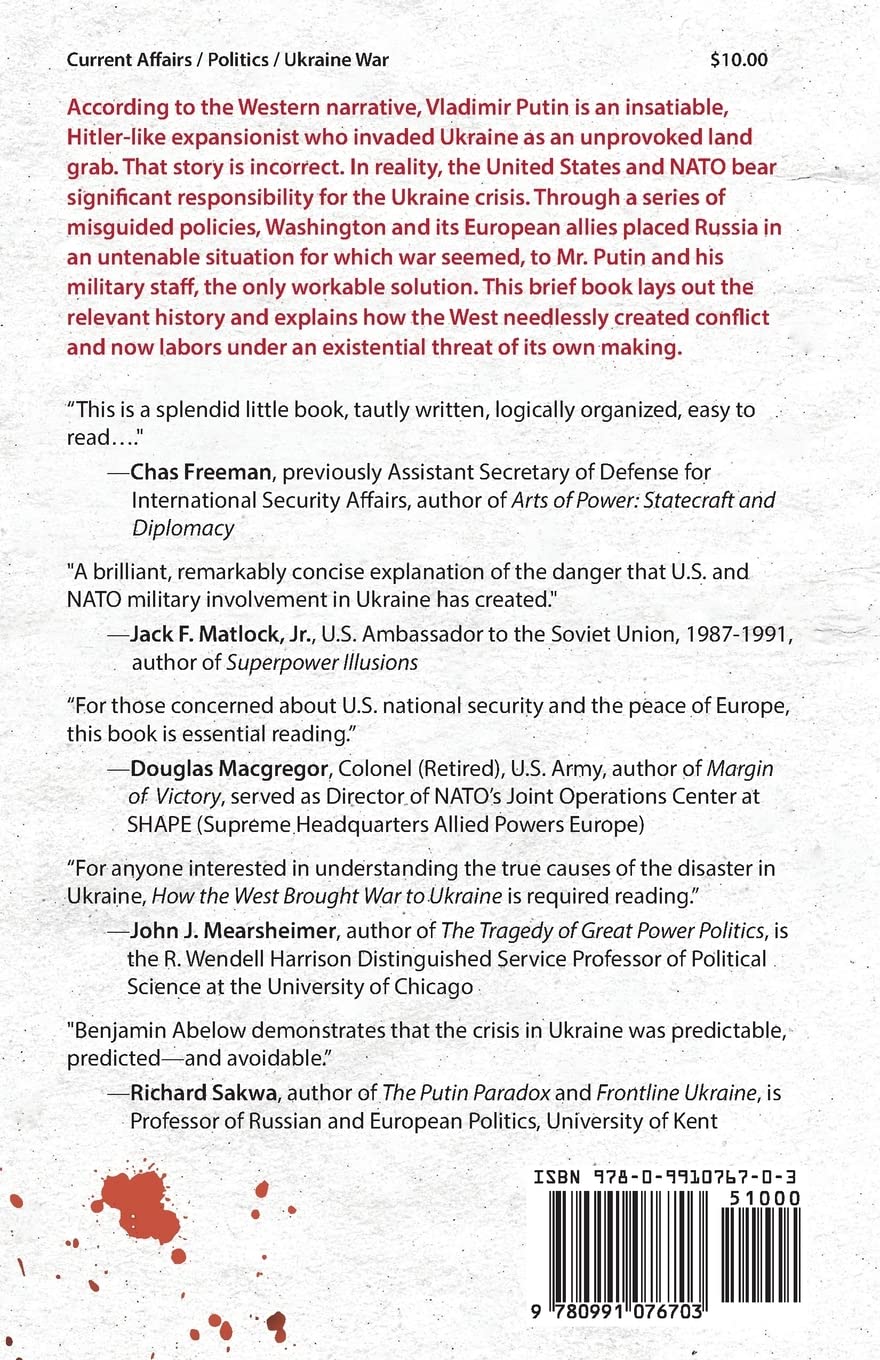


Full description not available
I**N
Ukraine.....superb insight
An excellent explanation on the rights and wrongs of the war in Ukraine and the usual misguided interference by America in world affairs and which true to form explodes in their face.
N**Y
The Truth to Counteract the Mainstream Narrative
An excellent and easy read that explains how the West/NATO expanded their land after the Ukrainian coup in 2014. It explains that the conflict in Ukraine is not a land-grab by Russia as presented by the mainstream media and the NATO politicians but an attempt to safeguard the ethnic Russians in the Donbass and prevent US nuclear weapons being placed on Russia's doorstep.
R**E
An outline of the consequences of Western actions towards Russia
Interesting and informative read yet very brief and simple not going into too much detail, Many peoples such as oneself who follow the arguments revolving around the causes of the war have already been familiar with many of these arguments however what would have improved this text would have been a more in-depth look at Ukraine and the political developments within Ukraine such as the political situation, the Donbas civil war and the failure of the implementation of the Minsk 2 which were only briefly mentioned.
D**N
UNDERSTANDING RUSSIA’S PERSPECTIVE
How ever much we disagree with Russia’s undoubted authoritarianism, nationalism and intolerance it is vital to understand Russia’s perspective rather than lazily resorting to relentless demonisation.Russia has a history of being invaded from the west; at the beginning of the 19th century, at the beginning of the 20th century and, most devastatingly, during the 2WW when the USSR lost more people than the combined total of the rest of its western allies.In 1949, following the 2WW, the North Atlantic Treaty Organisation (NATO) was set-up. Such an Atlantist vision was opposed by Stalin who saw NATO as confrontational so, in 1952, countered with a proposal to improve Eurasian security by offering to withdraw from eastern Germany. Stalin’s preconditions were that the Allies withdraw troops from western Germany and that Germany remain militarily neutral following unification.Unfortunately, the west rejected Stalin’s offer as it preferred to confront the USSR with NATO, dominated by the USA which spends more on its military than the next ten countries combined; including Russia and China. So, in 1955, as a defensive response, the Warsaw Pact was set up.It is instructive to compare the USSR’s proposal for German neutrality with Russia’s proposal for Ukraine’s neutrality following the western provoked far-right 2014 coup in Ukraine. In order to fully understand Russia’s demand that Ukraine remains a neutral independent country, it is worth remembering the US reaction when the USSR located missiles in Cuba in 1962. That was the last time the world came to the edge of nuclear war. When judging accusations of Russian expansionism, it is also worth acknowledging that Russia’s small but immediate neighbour, Finland had previously not sought the ‘protection’ of NATO yet it has not been invaded.Rather than empire-building, having suffered so intensely through the 2WW, the USSR’s determined priority has always been security. In 1981, on a visit to Bonn, Brezhnev promoted the idea of a ‘Common European Home’ in the hope of moderating American confrontation. In April 1987, during a visit to Czechoslovakia, Gorbachev went on to describe the strategic importance of the ‘all-European house’. In his main address he declared;We assign an overriding significance to the European course of our foreign policy.... We are resolutely against the division of the continent into military blocs facing each other, against the accumulation of military arsenals in Europe, against everything that is the source of the threat of war. In the spirit of the new thinking we introduced the idea of the "all-European house"... [which] signifies, above all, the acknowledgment of a certain integral whole, although the states in question belong to different social systems and are members of opposing military-political blocs standing against each other. This term includes both current problems and real possibilities for their solution Again, in his July 1989 speech to the Council of Europe, Gorbachev declared;The philosophy of the "Common European Home" concept rules out the probability of an armed clash and the very possibility of the use of force or threat of force – alliance against alliance, inside the alliances, wherever. This philosophy suggests that a doctrine of restraint should take the place of the doctrine of deterrence. This is not just a play on words but the logic of European development prompted by life itselfDespite these constructive proposals for Eurasian security, the USSR ultimately collapsed under relentless western pressure. NATO broke promises it had made not to move an inch east and Russia, the most extensive country in the world with vast natural resources, continued to be besieged by surrounding US and NATO bases.In stark contrast to US pressure, the newly established Russia’s principal foreign policy objective was to join the West, to become an integral player in Greater Europe and even a major ally of the United States. Russian leaders achieved accession to the Council of Europe (1996), the G7 (1997), and the World Trade Organization (2012). They sought NATO and Organization for Economic Co-operation and Development membership and even considered joining the EU.Nevertheless, NATO continued to expand east and a 1997 New York Times article by George Kennan (an American diplomat, historian and advocate of Soviet containment) entitled “A Fateful Error” did not mince his words in arguing that “expanding NATO would be the most fateful error in American policy in the entire post-cold war era”. He predicted that “it would inflame nationalistic, anti-western and militaristic tendencies in Russian opinion”, “have an adverse effect on the development of Russian democracy”, “restore the atmosphere of cold war to east-west relations”, and “impel Russian foreign policy in directions decidedly not to our liking”.Ignoring these wise words, much more powerful US interests feared the economic threat to US hegemony posed by a Greater Eurasia of 630 million inhabitants. The USA preferred to see its long-term interests best served by prolonging the Ukrainian conflict in order to weaken Russia and, indeed, to weaken Europe!Putin continued Russia’s push for a Greater Europe from Lisbon to Vladivostok as early as 2010.After the 2014, western provoked, far-right coup in Ukraine, Putin announced to the St. Petersburg Economic Forum in 2016 the Russian government’s desire for a greater Eurasian partnership. Putin proposed “considering the prospects for more extensive Eurasian partnership involving the Eurasian Economic Union,” in which countries such as China, Pakistan, Iran, and India would also be included. Since then, Putin has consistently promoted the project in his addresses to the Federal Assembly, in meetings with foreign leaders, at subsequent St. Petersburg Economic Forums and at the Eastern Economic Forums held in Vladivostok;An awareness of the distortion created by powerful western vested interest’s (including arms traders) and their media, as well as a deeper appreciation of Russia’s perspective could have led to a more constructive western response to Russia’s security needs and prevented the current destruction of infrastructure, human carnage and environmental degradation.Finally, it should also be acknowledged that, though Russia may be the architect of the Greater Eurasian partnership, it will surely be China that will decide its fate.
C**S
Excellent
Mr Abelow has presented a truly masterful argument in this brilliantly short book.The war in Ukraine is complex both politically and historically, but Mr Abelow manages to condense and present so much important information, that is both highly readable and understandable.He uses excerpts from many Russian experts, political analysts, former members of the US secret service, government and military to support his own analysis.This is a frightening and eye opening book that everyone should read!
A**N
Makes some interesting arguments
Whilst not sympathising with Russia's invasion of Ukraine the book attempts to help you understand Putin's motives and how the West has contributed to them. It can make unsettling reading at times and makes some good points, particularly when asking what a western nation would do under similar circumstances to Russia.What I didn't like about the book is that it refers to the demonstrations and resignation of Ukraine's president in 2014 as an American backed coup, when it was clearly a popular uprising against a government refusing to fulfil the will of the majority of Ukrainians by signing a deal with the EU.The author also seems to infer that President Zelensky didn't do enough to find a peaceful resolution to the Conflict with Russia on its borders prior to the full scale invasion, without explaining why.
D**S
It is the truth
Everyone should read this and form an opinion, not the tune played by the media
M**N
Superb and cogent overview of the cause of the war in Ukraine
Excellent and balanced interpretation. Puts the blame for the long and medium term causes at the door of us and America. The immediate cause is clearly Putin’s decision to invade. Short and clear. Why is there so little analysis in the press. Putin didn’t invade to re establish the empire of Peter the Great, but to stamp out Ukrainian decision to join NATO, proposed by the US in 2008 and 2021. I recommend.
K**R
Interesting reading
I recommend this book to anyone who is a critical thinker. The author points out facts that need to be considered, before going with main stream media's narrative of disinformation.
F**X
Excellent summary
This slim volume contains an excellent summary of the reasons why US involvement in the Ukraine conflict is destructive of Ukraine and its people, and a threat to world peace. If you support US involvement, you should read it to learn the compelling counter-arguments that are not often aired in the news. If you are a skeptic or undecided, it's worth reading for a clear discussion of the strategic and humanitarian considerations of the war. This is stuff worth knowing, whatever your view. It can easily be read in 2-3 hours and contains citations to supporting materials you can pursue if interested. Given the human and financial cost of the conflict, and the risk of a wider war, informed citizens should be aware of these arguments.
M**9
The West done it!
Look no further than America's hegemonic ambitions. Basic fact - US in decline, China on the rise. So, weaken Russia as a partner for China - crash the Russian economy through sanctions, protracted war, regime change, split Russia into 3 or 4 bits. Then turn on China. This is essentially what the Ukraine war is about, the West supplies the cannons and the Western Ukrainians the cannon fodder.It isn't working, it won't work, but bullying and militarism is all that the US has left.
S**H
Simple, sensible, straightforward
The book comes as a careful, if brief, analysis of the situation in Ukraine. The author has analysed the march to war from 1990 and shown how the NATO expansion to Russian borders has produced this catastrophe. Good for beginner readers and has something even for experts.
R**S
Perfect
Excelente book - short but full of valuable and trustworthy information. All Europeans should read this book.
Trustpilot
3 weeks ago
5 days ago